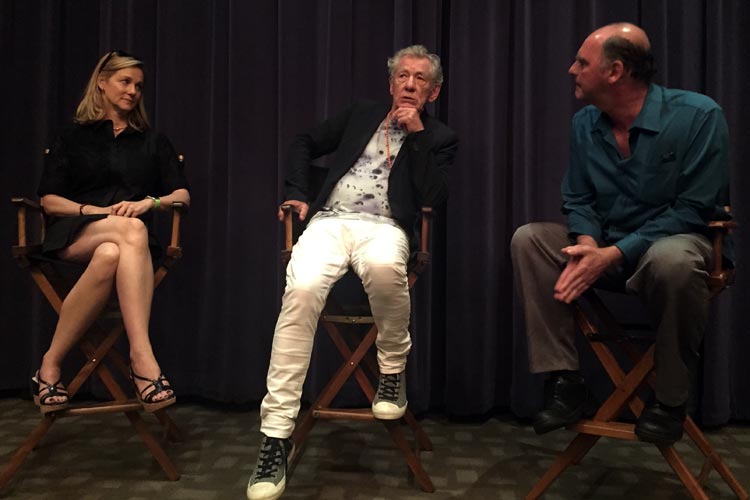The following questions and answers are excerpted from a conversation that followed the NBR screening of Mr. Holmes.
Mr. Holmes exists in two different time frames, 30 years apart. How do you approach these two very different characters who are the same person?
McKellen: With excitement, because it’s a nice challenge. To play an older man, and then a younger man. The actor gets to show off a bit.
Linney: My favorite shot in the whole movie is the tracking shot of Mrs. Kelmont walking through and you following her. It’s so elegant. The physicality of the younger Mr. Holmes haunts the whole rest of the movie.
“You can learn how someone moves by the rhythm of the language”
McKellen: That’s a bit of London that exists. That’s not faked. I do think this movie is a bit of a British tourist board advertisement. I love that moment when the young Mr. Holmes goes after the wonderful actress Hattie Morahan [Ann Kelmont]. I’ve got to show that the younger version of him has more energy. So when he’s going after her and he’s approaching the gates and there are a bunch of steps, I just sort of jump up on them. You can be sprightly at 60. At 76, it gets a bit trickier!
When you are learning a character, how they move, how they talk, what is the process like for you?
Linney: Every movie is different for me. How I start is just reading it and reading it. And this is going to sound a little strange, but then the script will sort of tell me what to do. You start to feel your way through. I do a lot of preparation and then I throw it all away. And I walk into work, and I’m that person, and I’m in their clothes, and I’m on that day’s set. You’ve made all these decisions and they guide you through, but you have to throw it all away and just be there and react. And it’s always about the other person. It’s never about you. It’s always about who you’re looking at, what you’re hearing, and what you’re seeing. So really, my performance is because of Ian, and because of Milo [Parker]. But it’s different for every movie.
McKellen: I realized a while ago that not only does every human being look like themselves, but we’ve all got individual hands and we move them in individual ways. And we are all different and we walk differently. Every human being walks like himself or herself. It’s surprising how few actors care to change the way they walk. I like to walk like the character does, which isn’t quite like me.
Linney: You can also learn how someone moves by the rhythm of the language, if you’re a really great writer. The language can indicate movement. If it’s nervous language, if it flows . . . there are hints everywhere. That’s what I love about the process. When I did Abigail Adams, the single most interesting thing to me was that she was severely pigeon-toed. So underneath all those garments was someone who was tripping over herself most of the time, and what does that do to someone to stay balanced. Something just as little as that will inform.
You mentioned that Bill Condon is director that actors love to work with. What is it that he does so well?
Linney: It’s a long list.
McKellen: It’s not just actors, you see, it’s everybody. Bill has all the determination and strength of the control freak without any freakness. He wants everything to be right and leaves nothing to chance. You really get the impression that your contribution is valued. And he’s very clear about what he wants. We’d do anything for him.
Linney: We would. And that goes for everyone on the crew. That goes for editors, cinematographers, everyone. He’s one of those people that just makes every experience better. When you have a great director, it infects every bit of the environment. He creates a spectacular environment in which people can really do good work. He’s collaborative in a way that is not patronizing, but at the same time doesn’t deflate his own importance to the group. You know he’s the one in charge and you want him in charge. And he’s so technically proficient that he has an enormous amount of time to deal with the actors. You just want to be around him.

